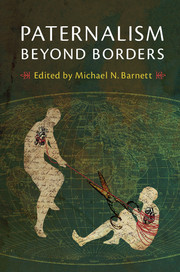Book contents
- Frontmatter
- Contents
- Notes on Contributors
- Acknowledgments
- Introduction: International Paternalism: Framing the Debate
- Part I The Boundaries of Paternalism
- Part II Paternalism, Old and New
- 3 Eurocentric Pitfalls and Paradoxes of International Paternalism: Decolonizing Liberal Humanitarianism 2.0
- 4 The New International Paternalism: International Regimes
- Part III The Social Relations of Paternalism
- Conclusion: The World According to Paternalism
- Index
3 - Eurocentric Pitfalls and Paradoxes of International Paternalism: Decolonizing Liberal Humanitarianism 2.0
from Part II - Paternalism, Old and New
Published online by Cambridge University Press: 01 December 2016
- Frontmatter
- Contents
- Notes on Contributors
- Acknowledgments
- Introduction: International Paternalism: Framing the Debate
- Part I The Boundaries of Paternalism
- Part II Paternalism, Old and New
- 3 Eurocentric Pitfalls and Paradoxes of International Paternalism: Decolonizing Liberal Humanitarianism 2.0
- 4 The New International Paternalism: International Regimes
- Part III The Social Relations of Paternalism
- Conclusion: The World According to Paternalism
- Index
Summary
Paternalism is a key property of life in the modern Western world. Even at its best, it is a two-headed creature, with a benign face looking one way and a controlling face looking the other. Accordingly, paternalism can have a sweet-and-sour taste for those on its receiving end in that while it can provide various benefits, it comes at an inevitable cost – specifically, a sense of loss of ownership or agency by those on the receiving end. And this can evoke a range of negative feelings running from quiet irritation to outright anger, and from passive complacency to alienation. But there is another dimension of paternalism that reflects its two-faced nature. Paternalism faces both inwards to the domestic sphere and outwards into the international arena. Its dual-faced property is ultimately significant because its nature differs depending on which spatial arena we focus upon.
In the domestic arena “at home,” paternalism is often attached to the “progressive” provision of services based on specialist expertise, found particularly in the education system and health services as well as the welfare state. For example, while university undergraduates might dream of telling the lecturer what exactly it is that they should study, the reality is that teaching at the undergraduate level is inherently paternalist precisely because students cannot know exactly what it is that they might want to learn until they have learnt that which they need to know. Only once they have been “properly equipped” with the “requisite portfolio” of educational skills and knowledge can they “be allowed” in the fullness of time to progress to a position where they can be in full control of their own learning destiny – specifically at the Ph.D. level.
Paternalism, and, I would add, maternalism, are yet more prevalent within the welfare state – especially in the caring professions and the health-service industry. Doctors, with their specialist expertise, will make decisions on behalf of their patients often without fully explaining why they are doing so and often not bothering to gain explicit consent.
- Type
- Chapter
- Information
- Paternalism beyond Borders , pp. 99 - 131Publisher: Cambridge University PressPrint publication year: 2016
- 3
- Cited by

